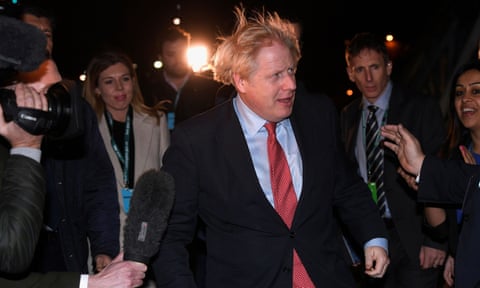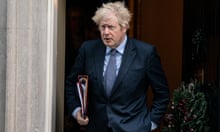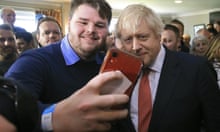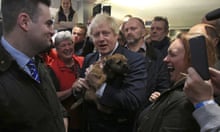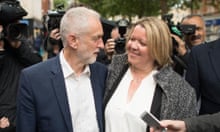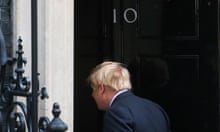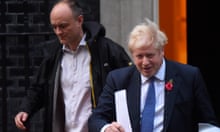Britain’s prime minister, Boris Johnson, secured a crushing victory in the UK’s general election as voters backed his promise to “get Brexit done” and take the country out of the European Union by 31 January next year.
Johnson’s Conservatives captured 364 of the 650 seats in the House of Commons with all bar one seat counted, a comfortable majority of 74 and the party’s best showing in a parliamentary election since Margaret Thatcher triumphed in 1987.
He addressed the nation just after 7am in London, saying Brexit was now the “irrefutable, irresistible, unarguable decision of the British people” and promising those who lent their vote to the Tories in traditional Labour areas: “I will not let you down.”
Earlier, in his seat of Uxbridge and West Ruislip west of London, he said the government had been given “a powerful new mandate to get Brexit done … I think this will turn out to be a historic election that gives us now, in this new government, the chance to respect the democratic will of the British people”.
As results from across the country suggested the exit poll would prove correct and seat after seat in the opposition Labour party’s strongholds swung from Labour red to Tory blue, Johnson’s gamble on calling an early vote after long months of parliamentary deadlock over Brexit appeared to have paid off.
The prime minister will now move swiftly to ratify the Brexit deal he sealed with Brussels, allowing Britain to exit the bloc, more than 40 years after it originally joined, at the end of next month – nearly a year later than originally planned and three-and-a-half years after Britain voted to leave.
He said in an address outside Downing Street on Friday that both sides of the debate should “find closure and let the healing begin”, but Brexit will be far from “done”.
Johnson must now negotiate a multi-part deal governing the UK’s future relationship with the world’s largest trading bloc, a process most experts think could take years but he has promised can be completed during an 11-month transition period due to end in December 2020.
Labour, meanwhile, whose leader, the veteran socialist Jeremy Corbyn, had presented voters a manifesto offering a second Brexit referendum and a radical expansion of the state, was plunged into bitter recriminations after the party won just 203 seats, its worst result in 84 years.
Labour lost seats it had held for long decades in former industrial areas in the Midlands and north of the country England as voters who had overwhelmingly backed Brexit in the June 2016 referendum swung towards the Conservatives.
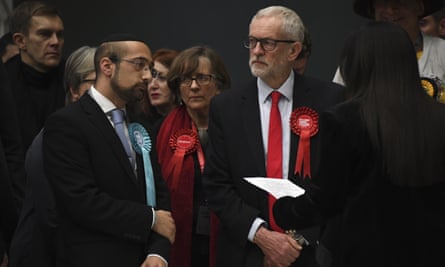
Corbyn, 70, said on Friday he would not lead the party into the next election. He said he was “obviously very sad at the result we’ve achieved” and suggested he will step down in the early part of next year, but insisted he had “pride” in the party’s policies.
His critics blamed the party’s losses on Corbyn’s ambiguity over Brexit and said voters had expressed antipathy to him during the campaign. Corbyn, who was elected leader in 2015, has alienated moderates by shifting the party firmly away from the centre ground that brought Labour three successive election victories under Tony Blair.
He has also faced accusations of failing to tackle antisemitism in the party. “It’s Corbyn. Jeremy Corbyn was a disaster for Labour – everyone knew that he couldn’t lead the working class out of a paper bag,” said Alan Johnson, one of Blair’s former ministers.
Ruth Smeeth, a Labour MP who lost her Midlands seat, said Corbyn should take the blame for the party’s defeat and resign. “There are genuine questions about whether the Labour party has a right to exist,” she said. “Who do we exist to represent?”
But loyalists blamed Brexit for the debacle, and insisted the party could not return to the centre. “We need to fight back, not triangulate,” said Richard Burgon, Corbyn’s justice spokesman. “People on the doorstep weren’t complaining about our policies, and we wouldn’t have had the policies ... if it weren’t for Jeremy’s leadership.”
The anti-Brexit Scottish National party was on course to win a sweeping victory in Scotland, seizing 48 of the 59 seats and setting the scene for it to campaign for a second vote on secession from England after rejecting independence in 2014.
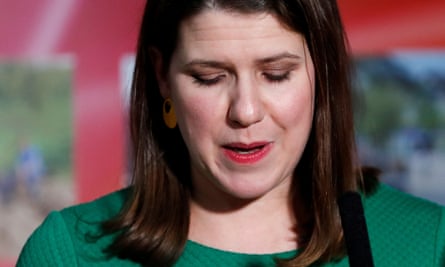
The Liberal Democrats leader, Jo Swinson, resigned after losing her seat in Scotland to an SNP candidate. The Lib Dems, as pro-European as the SNP, returned 13 MPs to Westminster. The election results would “bring dread and dismay and people are looking for hope”, Swinson said.
The SNP leader, Nicola Sturgeon, said: “There is a mandate now to offer the people of Scotland the choice over our own future … Boris Johnson may have a mandate to take England out of the EU. He emphatically does not have a mandate to take Scotland out of the EU.”
The bombastic, permanently dishevelled Johnson, who was elected prime minister by his party only 20 weeks ago after his predecessor, Theresa May, failed to get her Brexit deal through a deeply divided parliament, called the vote to break what he described as the paralysis of a political system broken by the deeply divisive Brexit project.
As well as promising to “get Brexit done”, Johnson pledged increased spending on health, education and the police, and was handed a boost early in the campaign when arch-Eurosceptic Nigel Farage said his Brexit party – which failed to win any seats – would not compete in hundreds of seats to avoid splitting the pro-Brexit vote.
His thumping majority should now allow him to ignore the threat of rebellion by Eurosceptics in his own party, possibly opening up the prospect of a softening in the hardline approach he has so far adopted towards Brexit.
